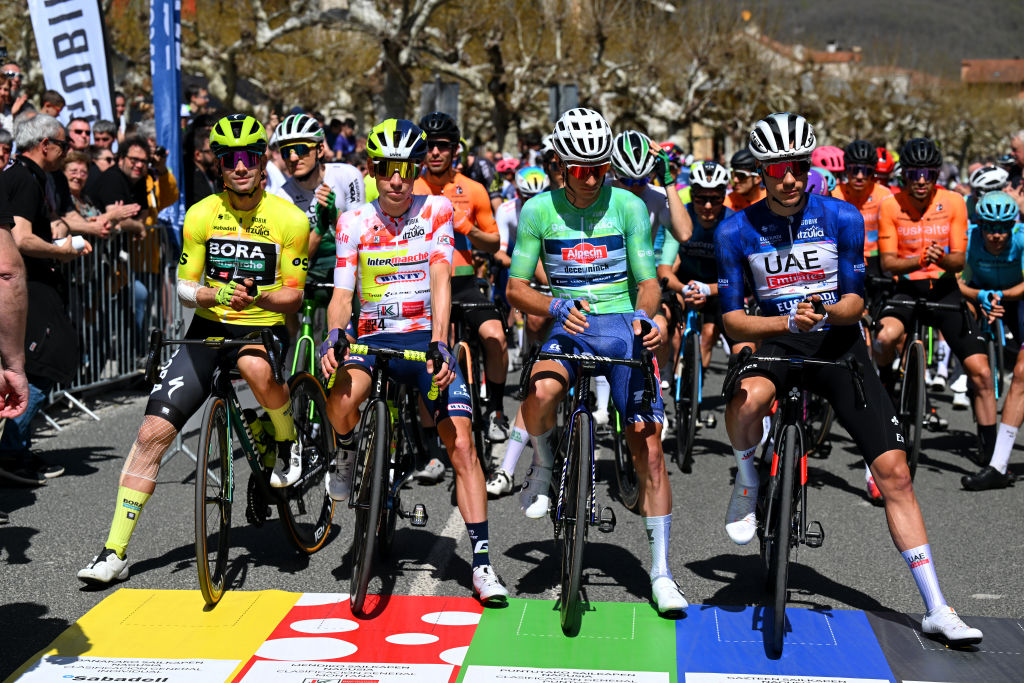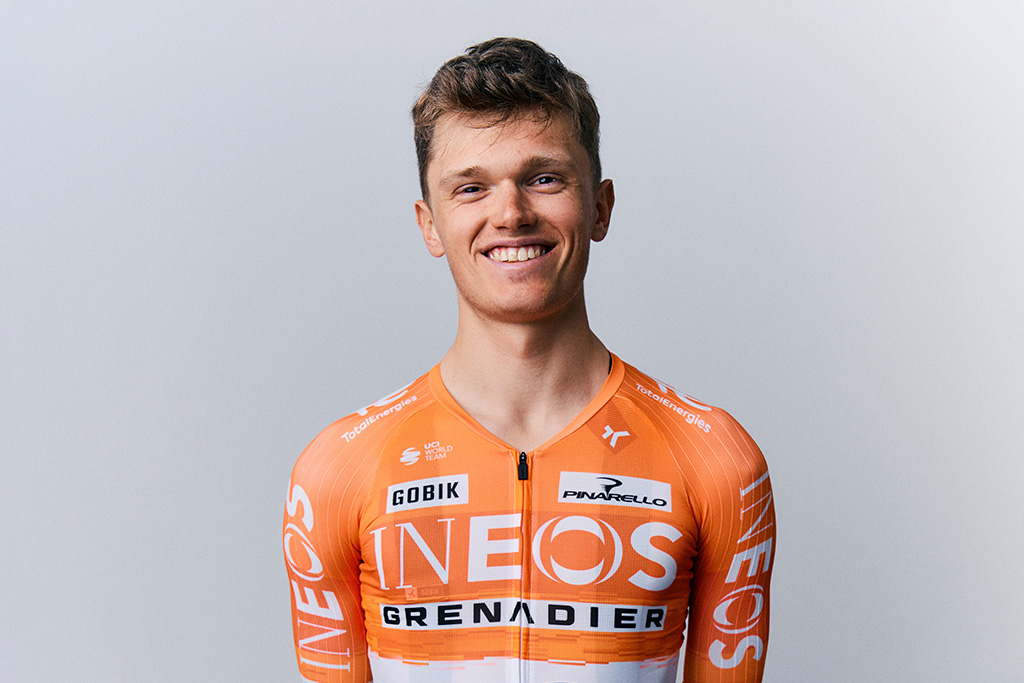Itzulia crash changes everything for Vingegaard and Evenepoel - Philippa York analysis
Road to the Tour de France looks very different after the dust settle in Basque Country

The latest race content, interviews, features, reviews and expert buying guides, direct to your inbox!
You are now subscribed
Your newsletter sign-up was successful
It’s not often you can mention ‘Primož Roglič’ and ‘crash’ in the same sentence and it turns out that he’s the lucky one. But cycling is full of surprises, which is why the Bora-Hansgrohe leader surviving two falls and abandoning the race while in the leader’s jersey can be described as fortunate. Miraculous, even.
Itzulia Basque Country was supposed to be about three from the big four contenders for the Tour de France going up against each other, checking on how Remco Evenepoel dealt with racing a Jonas Vingegaard in good form and a Roglič without any hampering injuries.
However, instead of reporting on who did what, where and when, the only thing we’ve learned from their encounter has been of an entirely different nature. Up until the descent off the Olaeta climb on stage 4, this was what we knew as far as the form book was concerned: Roglič was 7 seconds ahead of the Belgian champion, with Vingegaard at 14 seconds.
They had been grappling a few seconds here and there in the intermediate sprints, which would have been crucial given the lack of a summit finish. Considering the overall result between them was always going to be a tight one, it seemed strange that Roglič didn’t get involved in those sprints, but maybe he was waiting for the final stages to consolidate his position.
We’ll never know, and instead of analysing the relative merits of each rider and their teams in the build-up to July, that focus has instead turned to how Vingegaard, Evenepoel and – to a much lesser extent – Roglič can recover from their respective injuries. In other words, what this now means for their Tour de France hopes and dreams. Objectively, even Tadej Pogačar’s plans could be affected because he won’t have as many potential rivals.
After trawling through the various healing times and physical limits during those weeks or months, there are some conclusions than can be made.
Sadly, I think Jonas Vingegaard won’t be winning a third Tour this year even if he makes it to the start – which, given the extent of his injuries, seems unlikely too. If it had been only – and I use 'only' with the greatest respect for each ailment’s consequences – the collarbone or ribs or punctured lung, then he may have had a fairly short disruption to his schedule. With all of them at the same time, it wouldn’t be prudent to think he can still line up in Florence for the defence of his title. His being kept in hospital shows the concern for just how seriously he is damaged.
The latest race content, interviews, features, reviews and expert buying guides, direct to your inbox!
For Remco Evenepoel, things are different. The rapid return to Belgium for surgery to his collarbone could mean he is back pedalling within a week, first on the home trainer and then gradually returning to the road with some care on choice of route. Nothing too hilly, and rough surfaces are to be avoided, but there have been riders back in the peloton 14 days after surgery. It really depends on each individual case.

More concerning for Evenepoel and Soudal-Quickstep is the shoulder blade fracture, as that can take longer to heal and it’s going to hinder movement as well as affect that perfected time trial position. Climbing while being mainly restricted to sitting wouldn’t affect him too much since he has an abundance of power, but squeezing onto aero bar extensions is another matter.
The doctors at the Herentals hospital have done their magic as far as the collarbone is concerned but it remains to be seen how the other fracture heals. Even if it is quick, the preparation to challenge Pogačar and co. at the Tour will be disrupted. I don’t think he will miss the Tour de France, but without an ideal run-in he may have to reconsider his objectives there. The Olympics could well become his main focus as a result of this setback.
Then we have Primož, who was able to raise a smile from the team car as it headed straight from the scene of the infamous crash to the hotel and no doubt to the airport ASAP. He was just happy to have survived another visit to the tarmac without breaking bones, unlike most of the others involved. With almost 2 weeks of healing time until the Ardennes classics he ought to be back in action there, though I wouldn’t be surprised if he skipped Flèche Wallonne and saved himself for Liège-Bastogne-Liège and a rendezvous with Tadej Pogačar.
Ayuso emerges in the aftermath
With all the focus on the bodies injured at Itzulia, the result of the race has been forgotten slightly, even though there was drama and suspense right until the finish line on the last stage. The retirement of the big three favourites opened up proceedings to those on their way up the rankings or those on the recovery trail, which meant a lot more action for Lidl-Trek to control for race leader Mattias Skjelmose.
They just managed that task on stage 5, after UAE Team Emirates attacked continuously with their multiple options of Brandon McNulty, Isaac del Torro, Juan Ayuso and Marc Soler. It was a sign of things to come that even Ineos tried their luck after a fairly subdued showing so far, with Michal Kwiatkowski reminding everyone how good a bike rider he is despite being on domestique duties in most events.
It was notable, too, that Tao Geoghegan Hart was back to somewhere near his full strength, pulling on the front and closing gaps well into the final hour. In the end, Romain Gregoire showed his potential winning a hectic sprint from a reduced bunch.
The last day, though, was always going to be difficult, with seven classified hills and 22 riders within a minute of Skjelmose. The weather might have been good for the majority of the race but the constant up and down eventually catches up with the non-climbers. Visma-Lease A Bike made an appearance in the early break and Sepp Kuss collected enough points to win the mountains jersey even though he had been ineffective during the preceding days.
Everyone knew UAE were going to throw everything at Lidl-Trek and they did, but it took until the final climb before they isolated Skjelmose. Then Juan Ayuso and Carlos Rodríguez took off and shared the spoils at the finish, GC for Ayuso, stage for Rodríguez. Skjelmose was relegated to third spot on the podium but the fact that UAE had 4 riders in the first seven signalled their collective team strength for stage races.
There were good points and bad from the final result. Ayuso took his first World Tour stage race, Carlos Rodríguez showed why Ineos believe in him and Skjelmose confirmed he’ll be a star of the future. For British fans, Oscar Onley has recovered from January’s broken collarbone and Tao Geoghegan Hart is at the front of bike races again.
Elsewhere, Visma’s poor results since their Paris-Nice/Tirreno-Adriatico double continued and Soudal-Quickstep had another worry with Mikel Landa breaking his collarbone. France could be reasonably happy with two stage wins, Gregoire for Groupama-FDJ and Decathlon’s Paul Lapeira proving the fastest on the miserably wet second day. Of course, Alpecin-Deceuninck had their win with Quinten Hermans continuing the cyclocross vibe for them, but the event was a subdued affair overall.
Everyone was waiting for the showdown between Evenepoel, Roglič and Evenepoel on the final two days and when that didn’t happen all the tactics had to be rethought. Lidl-Trek tried but couldn’t deal with UAE’s depth, but as a team you can see the investment is beginning to pay off.
It’s a shame that the 63rd edition of Itzulia Basque Country may will be remembered more for the devastating crash than its spectacular performances.
Philippa York is a long-standing Cyclingnews contributor, providing expert racing analysis. As one of the early British racers to take the plunge and relocate to France with the famed ACBB club in the 1980's, she was the inspiration for a generation of racing cyclists – and cycling fans – from the UK.
The Glaswegian gained a contract with Peugeot in 1980, making her Tour de France debut in 1983 and taking a solo win in Bagnères-de-Luchon in the Pyrenees, the mountain range which would prove a happy hunting ground throughout her Tour career.
The following year's race would prove to be one of her finest seasons, becoming the first rider from the UK to win the polka dot jersey at the Tour, whilst also becoming Britain's highest-ever placed GC finisher with 4th spot.
She finished runner-up at the Vuelta a España in 1985 and 1986, to Pedro Delgado and Álvaro Pino respectively, and at the Giro d'Italia in 1987. Stage race victories include the Volta a Catalunya (1985), Tour of Britain (1989) and Critérium du Dauphiné Libéré (1990). York retired from professional cycling as reigning British champion following the collapse of Le Groupement in 1995.

